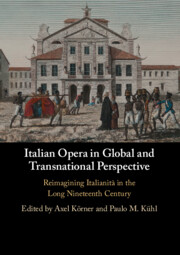 Italian Opera in Global and Transnational Perspective
Italian Opera in Global and Transnational Perspective Gaetano Donizetti, Bartolomeo Merelli and Habsburg Cultural Policies in the Mid-1830s
Published online by Cambridge University Press: 17 March 2022
The chapter discusses the role of Italian opera in Habsburg Vienna in relation to the cultural policies promoted by Austrian Emperor Ferdinand I (1835-48). It examines previously unknown negotiations between Donizetti and the Kärntnertortheater in the mid-1830s, emerging from recently discovered archival documents. These negotiations were part of an administrative reorganisation of the Kärntnertortheater aimed at reintroducing regular Italian opera seasons in Vienna, which had lapsed since the Italian impresario Domenico Barbaja left the city in 1828. The new impresario for Vienna’s Italian opera seasons, Bartolomeo Merelli, enjoyed an extensive business network in Italy. As the chapter shows, his appointment in Vienna was key to the reinforcement of Vienna’s cultural ties with Italy's major operatic centres. Together with Donizetti he maintained important connections with the Viennese aristocracy, which helped to sustain their professional and creative endeavours in the imperial capital. By focusing on this turning point in the nineteenth-century history of opera in Vienna, the chapter demonstrates how, at a time when national ideologies were spreading both north and south of the Alps, Italian opera became instrumental in asserting the supranational identity of the Austrian Empire.
To save this book to your Kindle, first ensure [email protected] is added to your Approved Personal Document E-mail List under your Personal Document Settings on the Manage Your Content and Devices page of your Amazon account. Then enter the ‘name’ part of your Kindle email address below. Find out more about saving to your Kindle.
Note you can select to save to either the @free.kindle.com or @kindle.com variations. ‘@free.kindle.com’ emails are free but can only be saved to your device when it is connected to wi-fi. ‘@kindle.com’ emails can be delivered even when you are not connected to wi-fi, but note that service fees apply.
Find out more about the Kindle Personal Document Service.
To save content items to your account, please confirm that you agree to abide by our usage policies. If this is the first time you use this feature, you will be asked to authorise Cambridge Core to connect with your account. Find out more about saving content to Dropbox.
To save content items to your account, please confirm that you agree to abide by our usage policies. If this is the first time you use this feature, you will be asked to authorise Cambridge Core to connect with your account. Find out more about saving content to Google Drive.